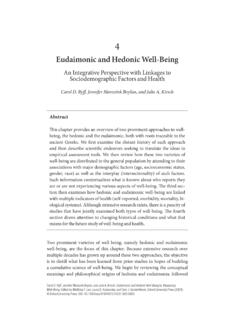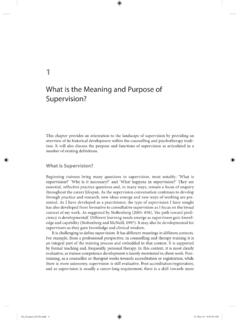Transcription of LOGOTHERAPY FOR CLINICAL PRACTICE
1 LOGOTHERAPY FOR CLINICAL PRACTICESTEFAN E. SCHULENBERGU niversity of Mississippi, OxfordROBERT R. HUTZELLK noxville, IowaCARRIE NASSIFFort Hays State UniversityJULIUS M. ROGINAD iocese of NevadaLogotherapy is based on the meaning-focused existential philosophy of ViktorE. Frankl (1905 1997). Numerous men-tal health professionals have been in-spired by his most popular book,Man sSearch for Meaning;however, manyare unfamiliar with the depth ofFrankl s work. The purpose of this arti-cle is to discuss the tenets of logoth-erapy, including fundamental concepts,applicability and techniques, roles ofthe therapist, and assessment tools andnew research findings. LOGOTHERAPY canreadily be integrated with techniquesthat mental health professionals fre-quently use, and thus it has much tooffer mental health professionals re-gardless of their theoretical :meaning, purpose in life, LOGOTHERAPY , Viktor Frankl, positivepsychologyLogotherapy is based on the existential con-cepts of Viennese psychiatrist and philosopherViktor E.
2 Frankl (1905 1997). Frankl chose thetermlogotherapy based on the Greek word logos as meaning because his perspectiveemphasizes the unique capacity of human beingsto perceive meaning. Many have been inspired byFrankl s most popular book,Man s Search forMeaning(Frankl, 2006; originally published inEnglish in 1959 asFrom Death-Camp to Exis-tentialism), written over a 9-day period shortlyafter his concentration camp liberation duringWorld War II (Hutzell, 2006; Klingberg, 2001).The book contains a narrative of concentrationcamp experiences and outlines some of the basicelements of LOGOTHERAPY . A sense of personallife-meaning is critical to LOGOTHERAPY , andMan sSearch for Meaningis a prime example of howpeople may reduce despair in severe circum-stances by incorporating personal meaningthrough attitudes, experiences, and s Search for Meaningwas written in 1945,yet it was still rated as one of the top 10 books tomake a difference in the lives of American readersas recently as the 1990s (Library of Congress,1991).
3 Russ Newman, American Psychological As-sociation Executive Director for PRACTICE , noted it tobe of particular relevance to psychologists after theterrorist attacks of September 11, 2001 (Newman,2002). The newest edition of the book (2006)indicates that there are more than 12 million copiesin print. Despite its continued relevance, many men-tal health professionals are not familiar with thedepth of Frankl s is credited withwriting over 30 were published originally in German, butthere have been translations into at least 32 lan-guages. He published over 700 articles. An abbre-viated version of Frankl s vita was published by J. in 2001 (Levinson, 2001). For more in-formation about Frankl s life and how it influencedthe formulation of LOGOTHERAPY , such as his youth inVienna, correspondence with Freud and Adler, ex-periences in concentration camps during WorldWar II, and his personal and professional develop-ment thereafter, the interested reader is referred toFrankl (1997b), Gould (1993), and Klingberg(2001).
4 The purpose of the current article is topresent various aspects of LOGOTHERAPY , includingmajor tenets, applicability and judicious use of theStefan E. Schulenberg, Department of Psychology, Univer-sity of Mississippi; Robert R. Hutzell, Knoxville, IA; CarrieNassif, Fort Hays State University; Julius M. Rogina, Dioceseof regarding this article should be addressed toStefan E. Schulenberg, PhD, Department of Psychology, Uni-versity of Mississipi, Oxford, MS 38677. E-mail: Theory, Research, PRACTICE , TrainingCopyright 2008 by the American Psychological Association2008, Vol. 45, No. 4, 447 4630033-3204/08/$ : , therapist strategies, assessment-related is-sues, and new research support and remainingneeds. Our intent is to provide an in-depth, yetconcise, orientation to LOGOTHERAPY compiled fromoften difficult-to-find publications ( , out-of-printsources), incorporating recently translated texts andcurrent and forthcoming empirical findings.
5 Thisarticle represents an update as to LOGOTHERAPY s cur-rent status in the United States, with emphasis onlogotherapy s utility and accessibility to a and Well-BeingA majorreason that LOGOTHERAPY has somethingto offer mental health professionals across varioustheoretical orientations has to do with the influenceof the meaning construct on human health and be-havior. There is a growing basis for the relationshipbetween a sense of meaning and psychological andphysical well-being (Melton & Schulenberg, 2008;Reker, 1994; Ryff, 2000; Ryff & Singer, 1998a,1998b; Savolaine & Granello, 2002; Spiegel &Fawzy, 2002; Zika & Chamberlain, 1992). For ex-ample, meaning may contribute to an array of areasrelated to wellness, including awareness of socialsupport, sense of identity and values, health-promoting behaviors (motivation to followthrough), and stress inoculation (Ryff & Singer,1998b; Savolaine & Granello, 2002).
6 Moreover, ina recent review of the literature, Melton and Schu-lenberg (2008) noted that meaning is associatedwith a range of outcomes, such as stable mood andless psychological distress, more proactive and so-ciable behavior, and favorable attitudes toward lifeand the self. Meaning has clear significance to thehuman condition. The concepts emphasized inlogotherapy are of interest to mental health profes-sionals striving to find ways to help their clientshelp themselves and are compatible with a varietyof existing theoretical orientations and the contem-porary positive psychology to Other Therapies andPositive PsychologySeveral sourcesindicate that spirituality (in thegeneral sense of meaning, values, and purpose, as isemphasized in LOGOTHERAPY ) is becoming increas-ingly relevant in modern psychotherapy and medi-cine (see DuBois, 2007, Mahoney, 2000, andSavolaine & Granello, 2002), and there is increas-ing evidence that spirituality is associated with pos-itive health outcomes (Seeman, Dubin, & Seeman,2003).
7 The field of psychology has shown increasedinterest of late not only in spirituality but also inresilience and positive mental health ( , Emmons& McCullough, 2004; Keyes & Haidt, 2003; Lopez& Snyder, 2003; Snyder & Lopez, 2002). Logoth-erapy has long emphasized the importance of mean-ing, faith, hope, humor, and many other adaptiveconstructs that have become a part of positive psy-chology; thus there is increasing support for theutility of LOGOTHERAPY concepts to researchers andclinicians. Frankl and other logotherapists havedonemuchclinical work in these areas, and thisexisting work can readily be incorporated into positivepsychology, as well as other, specific is often regarded as a humanistic existential school ofthought, but it has much incommon with other paradigms. Indeed, McMul-lin (2000) noted that LOGOTHERAPY is one of theprecursors to cognitive therapy (p. 31), and indescribing innovative techniques used in cogni-tive restructuring therapy (specifically perceptualshifting), he outlined many techniques that areconsistent with those practiced by relevant examples of perceptualshifting described by McMullin include bridgingtechniques, with the Hierarchy of ValuesBridges exercise being a prime illustration ofhow clients personally meaningful values hier-archy may be used to shift from old, maladaptivebeliefs into new, more adaptive , the creative, active, and strengths-focusedaspects of LOGOTHERAPY have parallels with con-structive therapies, such as solution-focused ornarrative-focused therapies (Combs & Freedman,1994.)
8 Furman & Ahola, 1994), in the encourage-ment of a more positive outlook in relation to saw LOGOTHERAPY , with its emphasis onthe meaning-dimension of human beings (oftentermed thespiritual dimensionin the broad senseof the word) as an addition to other therapies(Frankl, 1985, 1986, 1988, 2006), with the goalof enhancing techniques as opposed to replacingthem. Simply put, LOGOTHERAPY is intended to becollaborative (Fabry, 1981; Kovacs, 1999), and ithas been explored in relation to a number of1 LOGOTHERAPY techniques are described in a subsequentsection of this article. For additional information regardingperceptual shifting and relevant examples, the reader is re-ferred to McMullin (2000).Schulenberg, Hutzell, Nassif, and Rogina448specific forms of therapy over the years, withrational emotive behavior therapy (Hutchinson &Chapman, 2005) and acceptance and commit-ment therapy (Sharp, Schulenberg, Wilson, &Murrell, 2004; Sharp, Wilson, & Schulenberg,2004) being recent examples.
9 Training in logoth-erapy may benefit clinicians from a variety ofperspectives, given its congruence with many dif-ferent TenetsThe fundamental tenets of LOGOTHERAPY havebeen documented by Frankl in a number ofEnglish-language texts. Available books includethe most recent edition ofMan s Search forMeaning(Frankl, 2006) and the recent translationofOn the Theory and Therapy of Mental Disor-ders: An Introduction to LOGOTHERAPY and Exis-tential Analysis(Frankl, 2004). AdditionalEnglish-language texts includeThe Doctor andthe Soul: From Psychotherapy to LOGOTHERAPY (Frankl, 1986),The Will to Meaning: Founda-tions and Applications of LOGOTHERAPY (Frankl,1988),The Unheard Cry for Meaning(Frankl,1985), andMan s Search for Ultimate Meaning(Frankl, 1997a).Described in the aforementioned texts, oneconstruct central to LOGOTHERAPY is referred to asthetri-dimensional ontology the conceptualiza-tion of human beings along three overlappingdimensions: physical, psychological, and spiri-tual ( , noological, meaning oriented).
10 It iscommonly understood that human beings oftenrespond with conditioned or automatic reactions(such as self-statements, behaviors, and emo-tions) in the first two dimensions and that otheranimals also function in the first two third dimension is emphasized in logoth-erapy as distinguishing human beings from otheranimals. However, human beings do not have tofunction in the third dimension ( , can behavein conditioned and automatic ways). Functioningin the third dimension often demands a percep-tual shift away from the typical conditioned ad-herence to peer group expectancies or mass ad-vertising, for addition to the tri-dimensional ontology, LOGOTHERAPY s basic tenets assert that (a) humanlife has meaning, (b) human beings long to ex-perience their own sense of personal life mean-ing, and (c) human beings have the potential toexperience life meaning under all held the position that opportunities torespond in action, experience, or attitude exist throughout an individual s life, and whenthe chosen response is consistent with the indi-vidual s personal values hierarchy, the individualexperiences the longed-for sense of life held that each individual s personal lifemeaning incorporates reaching out to an overallorder to the universe, to other human beings, andto other animals.






